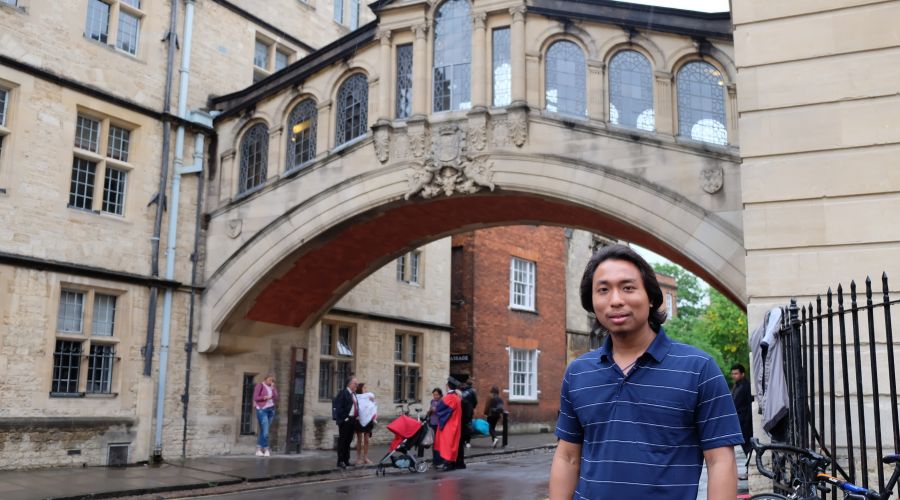Tapping the potential for science
"I am working in a place where Watson and Crick made their discoveries about DNA. The opportunities are enormous. Cambridge is a living legacy”
Mutum Yaikhomba’s story is a tribute to the value of blue skies research. As an undergraduate he benefited from being given the freedom to experiment and explore at IISER Pune, where he was in one of its early cohort of students and where he was able to combine different disciplines to further his research interests. He is now reaping the rewards as he deepens his research into proteins in the academically rich environment of St John's College, Cambridge, where he can access world-leading researchers and benefit from interdisciplinary communities like Gates Cambridge.
He is keen for his story to inspire other students, particularly those from his home state of Manipur in North East India which suffers from poor investment and infrastructure and whose human potential, he believes, is not being fully developed.
Yaikhomba’s PhD in Biological Science focuses on understanding the way that energy is created in the human body. It could help doctors treat a range of diseases caused when the process of breaking down food into energy doesn’t work.

Mutum Yaikhomba on a recent trip to Oxford
"I am working in a very collaborative environment in a place which is focused on developing potential"
Based at Cambridge’s MRC Mitochondrial Biology Unit, Yaikhomba (2017) has been using cryo-electron microscopy to look in close detail at the process of how food is broken down into smaller components and how these intermediates are then used to synthesise ATP, a chemical energy molecule that cells use for their fuel needs. For example, the protein mitochondrial complex I uses the energy from one of the food breakdown intermediates to pump protons (hydrogen ions) across a membrane. This build-up of protons then goes through another protein (ATP synthase) to synthesise ATP, the energy currency in cells. “It’s like storing water in a dam high up which is then pumped through a turbine to create power. My interest is in how the pumping mechanism works,” says Yaikhomba.
He is exploring how mitochondrial complex I works and says this could help scientists to understand a range of mitochondrial diseases which are caused by the pump not working. Yaikhomba says he has benefited hugely from the resources, scientific legacy and stimulating, entrepreneurial environment of Cambridge. He states: “I am working in a place where Watson and Crick made their discoveries about DNA which has influenced the whole field of molecular biology. I have access to amazing people, including Nobel Prize winners. I went to a venture creation weekend at Judge Business School to learn more about entrepreneurship and won the first prize. I am working in a very collaborative environment with a lot of resources and a world class supervisor and in a place which is focused on developing potential. The opportunities are enormous. Cambridge is in fact a living legacy.”

A walker sits on a rock's edge in the Dzükou Valley in Yaikhomba's home state of Manipur, India
“It was systemic discrimination to make me feel inferior and it has stayed with me my whole life”
Overcoming obstacles and prejudice
Yaikhomba has not had the easiest route to Cambridge and has faced systematic discrimination from an early age. He was born in Manipur in the North East of India. The state is bounded by Nagaland to the north, Mizoram to the south, Assam to the west and Myanmar to the east.
From 1980, the Indian government referred to Manipur as ‘a disturbed area’. That meant it was subject to laws which gave the military extraordinary powers to detain and shoot to kill individuals who they deemed a threat. Human rights organisations reported a number of abuses at the time, including disappearance and torture. Violence and blockades were the norm. One blockade lasted for two months and the state was effectively shut down.
Because of the political insecurity, it was common for those families who could afford it to send their children away to be educated. At the age of nine, Yaikhomba was sent to a boarding school in Mysore in southern India. In his first school or hostel he was one of several students from Manipur, but the hostel was closed and Yaikhomba had to move to another one where he was the only student from Manipur. There he was subjected to relentless racist bullying by the other students and staff. “It was like a paradigm shift,” he says. He was forced to do menial tasks that the other students didn’t have to do. He was subjected to physical violence, called names repeatedly and mocked about how he looked, his accent and how he dressed. “It was systemic discrimination to make me feel inferior and it has stayed with me my whole life,” he says.
He didn’t tell his parents because he thought it was normal. “I had internalised it all because it was my daily reality,” he says. However, eventually he met someone he felt he could confide in who told him it was not normal. He started telling his mother some of the things that were happening. His parents soon withdrew him from the school and sent him to another school in a different region of southern India which, although not devoid of discriminatory attitudes towards the North East, was much better.
Yaikhomba had always been good at exams and he loved to ask questions. The emphasis at the new school was on science and he excelled. He applied to the new Indian Institute of Science Education and Research in Pune and was one of only two students from North East India out of 110, who joined that year. The under-representation of people from his region, general prejudice and a lack of awareness of the bias they face is a symptom of the uphill battle they face in the Indian education system, says Yaikhomba. One comment from a fellow student sums up the attitude. He told Yaikhomba: “You’re from the North East. Behave accordingly.”
"I was a chemistry major, but spent a long time doing biology. This has been important in an age of interdisciplinarity"
A passion for science
Yaikhomba overcame this through his passion for science and became involved in research at an early stage - something which helped his later application to Cambridge. He says he was lucky to be at IISER as it evolved and developed. Everything was geared around science with inspiring external academics coming in to speak. He rotated around different laboratories and in his last two years had a very supportive supervisor, who gave Yaikhomba the freedom to do blue skies research in areas such as crystallography.
“It is very rare in India for undergraduates to participate in research along with their course work. It meant I could explore all the branches of science. I was a chemistry major, but spent a long time doing biology. This has been important in an age of interdisciplinarity,” he says. To study proteins, for instance, he uses chemistry and physics to freeze and observe protein particles and mathematical algorithms to average them out.
During his time at IISER Pune, Yaikhomba studied the role of a particular protein in regulating the movement of bacteria. He discovered that the N-terminal domain of the protein had different chemical characteristics from other parts which could bind with DNA purely based on biochemical aspects of the protein. A part of Yaikhomba’s results was contributed to the research work reported in PLOS Genetics.
Yaikhomba would like to see other students from his region benefiting from the kind of educational opportunities he has had. He says the North East region is home to 50 million people, but has sent only two PhD students to IISER Pune in 10 years - a worrying statistic. He adds that there is a general failure in his country to recognise and invest in the potential of the region which needs to be addressed. He hopes that his example will help to show the value of tapping that potential.
Published: 25/10/18